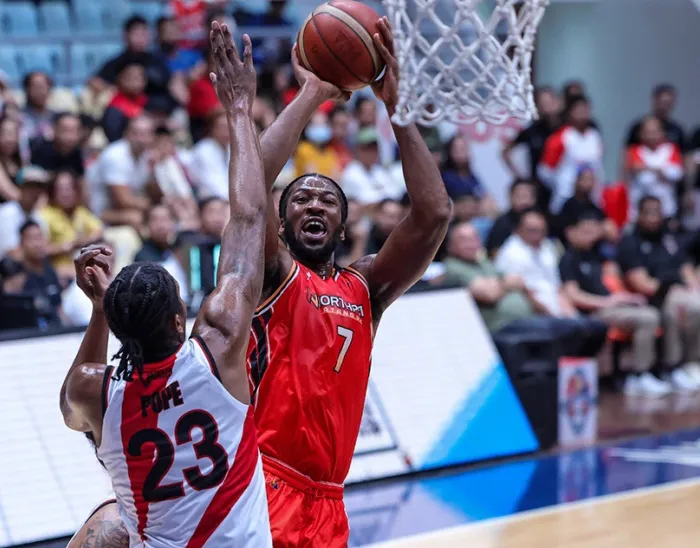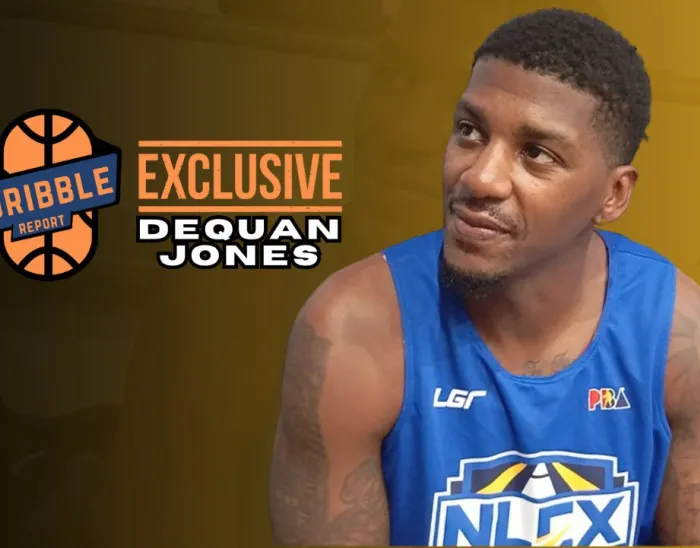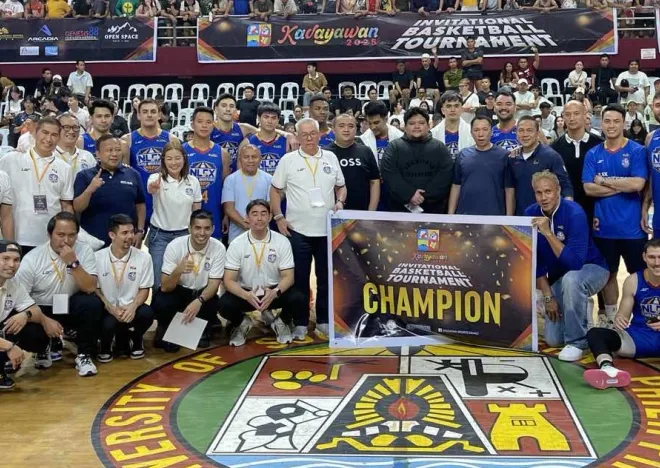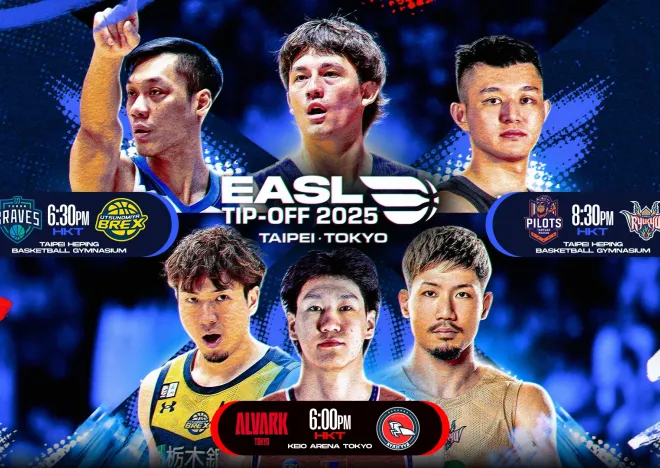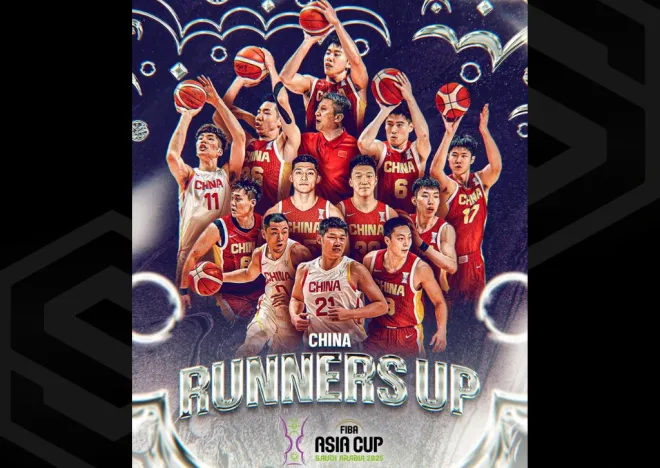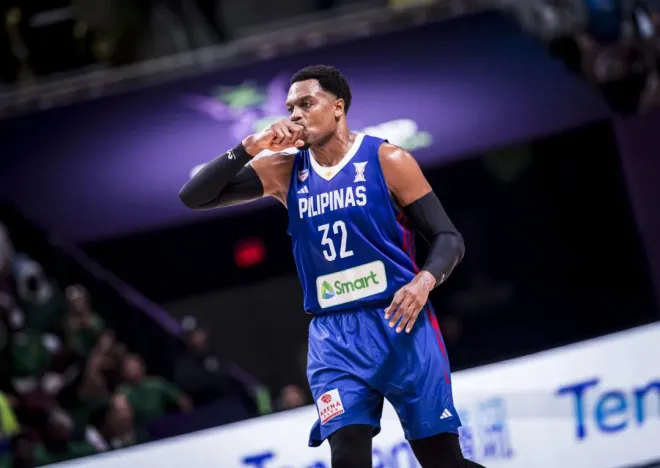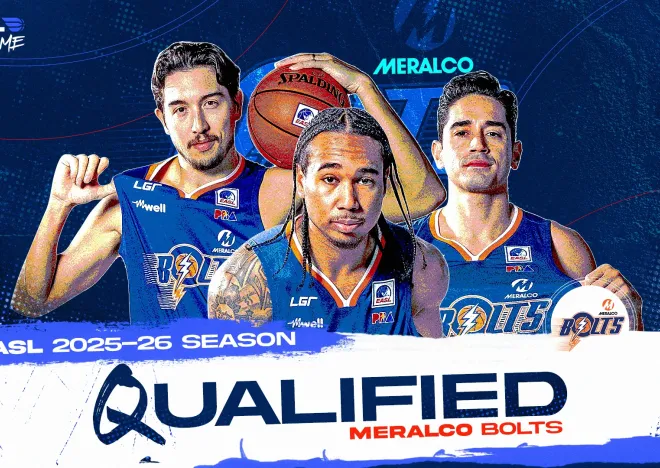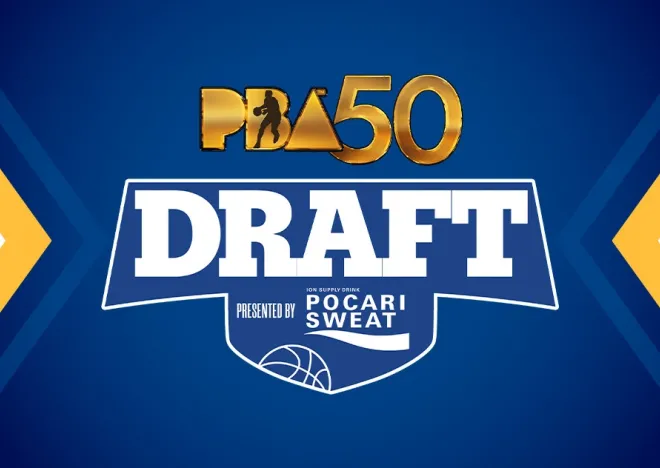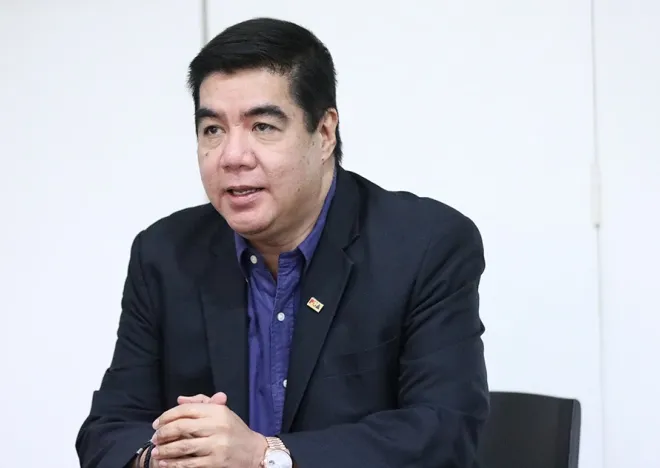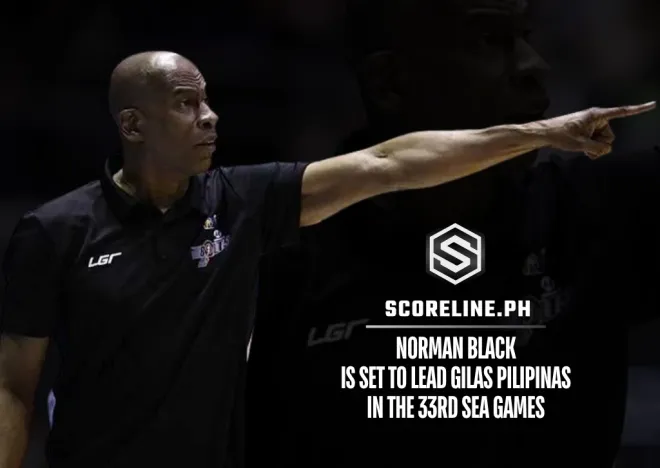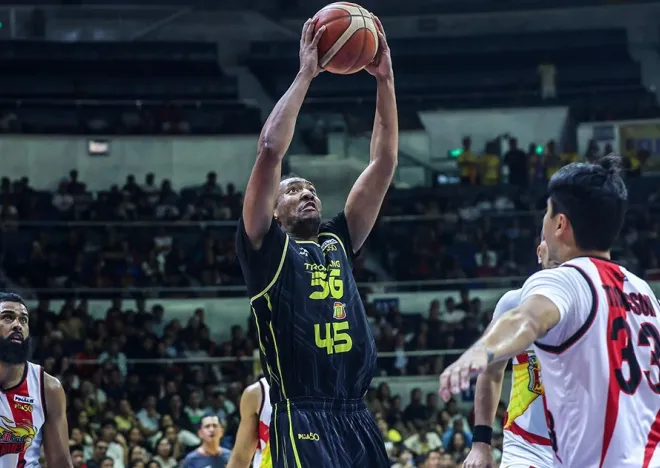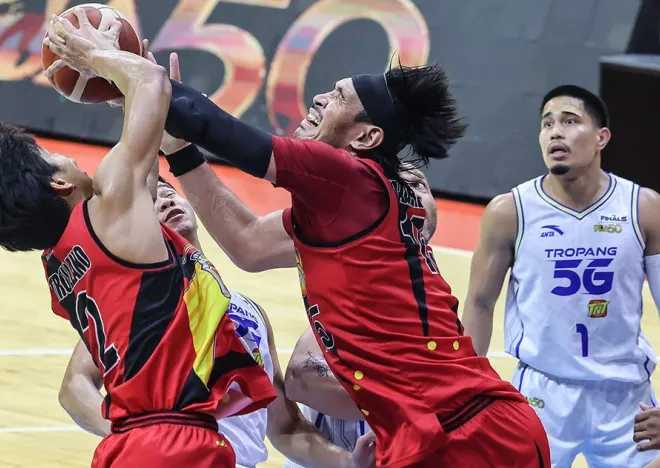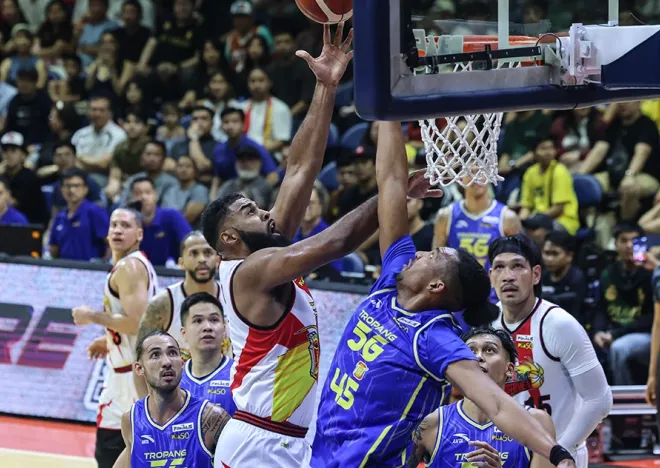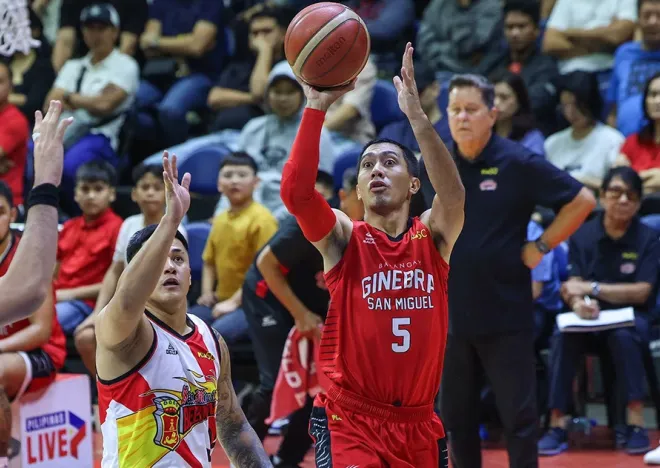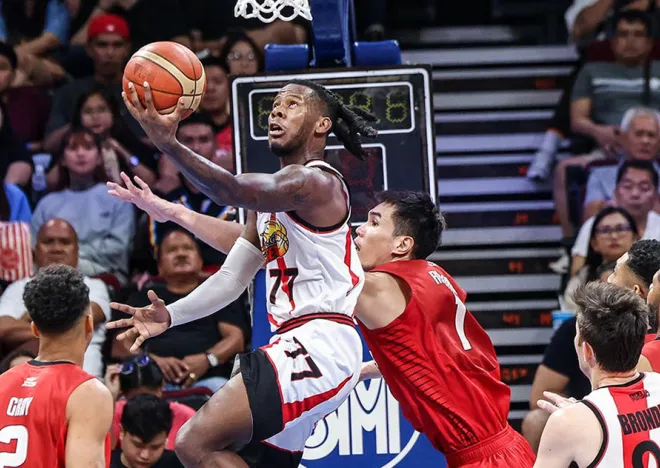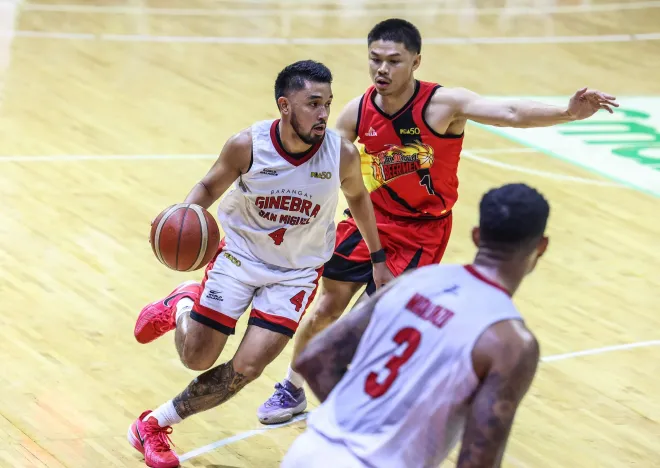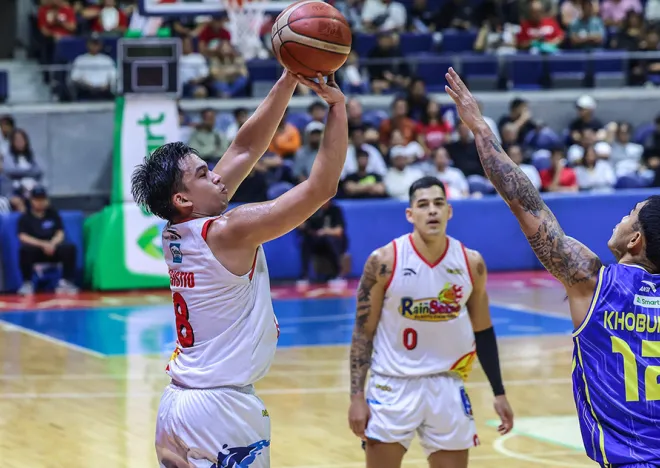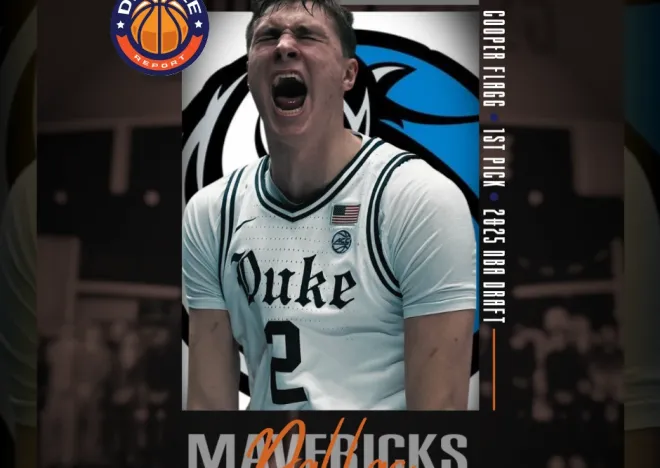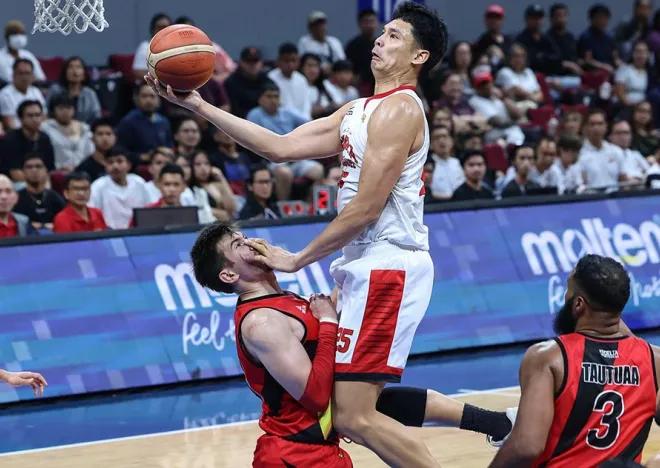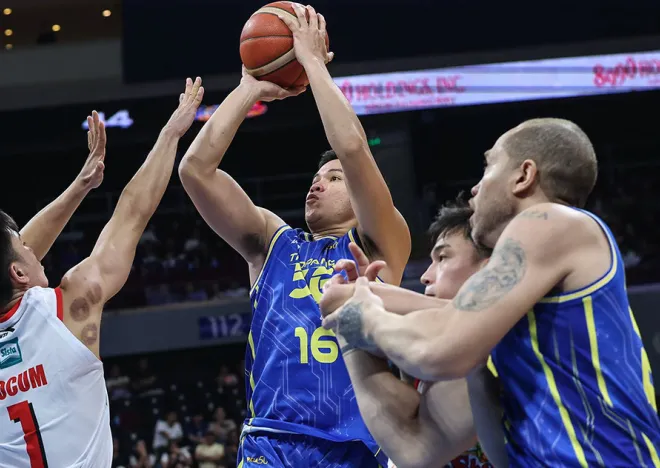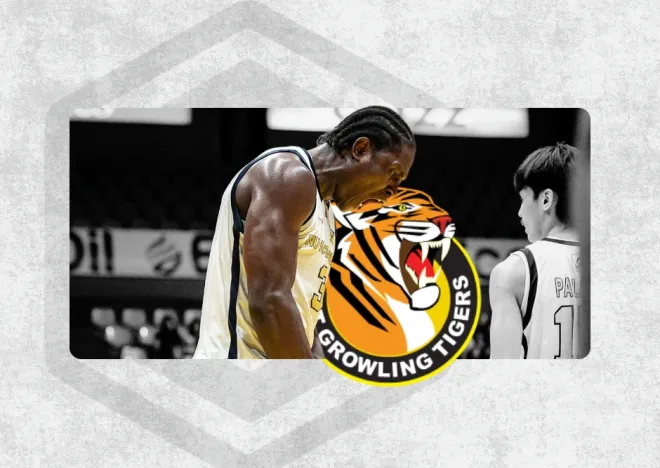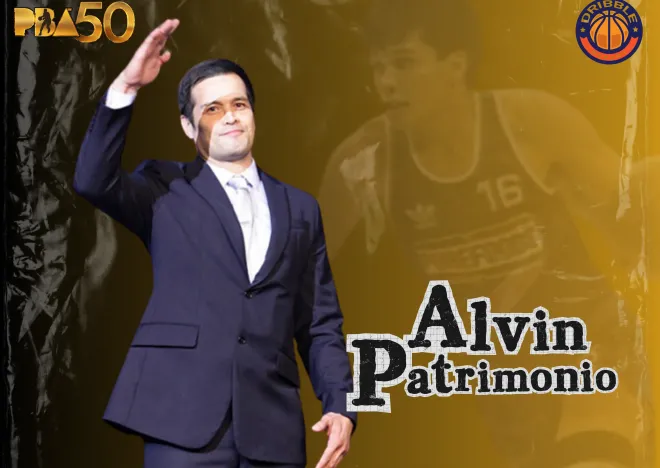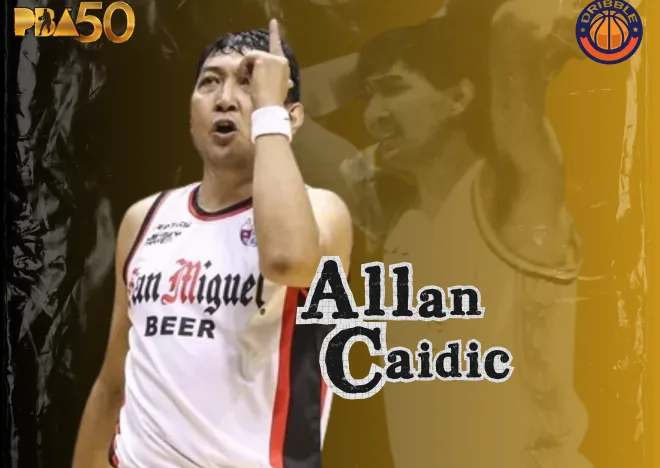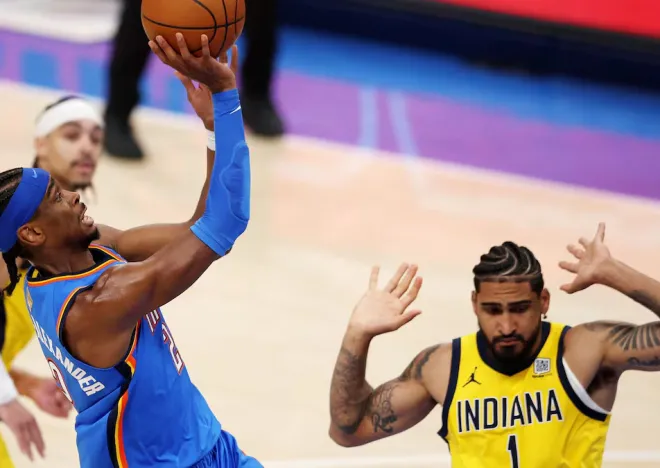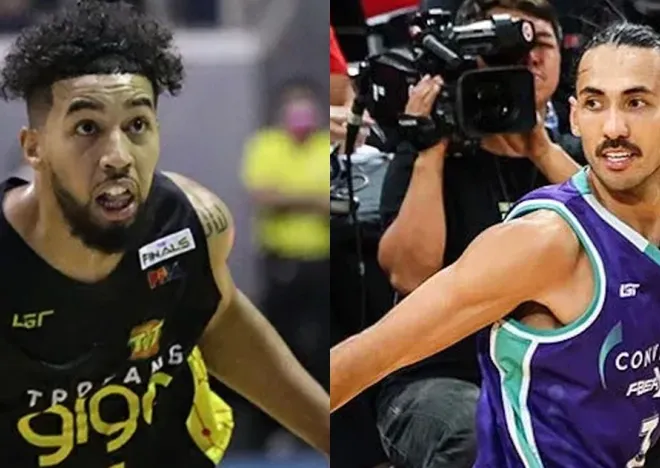Top news
- Bolts pour out frustrations against the Black Bears
- Rookies Tiongson and Lemetti: Instrumental firepower to dark horse Rain or Shine
- Pinoy Masters set to compete in World Masters Games in Taiwan
- UAAP Women’s Basketball: Adamson breeze past UE, UP shocks DLSU with late comeback
- Beermen come up short in EASL opener
- One-import format, guest team among changes for Commissioner’s Cup
- Celtics impressive in NBA’s 2024-2025 Season opener
News
The NLEX Road Warriors wrapped up their preseason on a high note, clinching the 40th Kadayawan Invitational championship with a commanding 101-84 victory over the Blackwater Bossing on Sunday night, August 26, at the University of Southern Philippines in Davao City.
It wasn’t the smoothest of starts for NLEX, which found itself down by 11 early in the game. But the tide shifted in the second quarter, where the Road Warriors erupted for a 34-12 run behind the efforts of Robert Bolick, Dominic Fajardo, Tony Semerad, and Xyrus Torres to seize a 52-36 halftime lead.
Blackwater attempted a late push, cutting the gap to 76-65 in the fourth quarter, but NLEX responded with a 12-5 counter that put the game out of reach. Semerad, who buried three triples in the payoff period, earned Finals MVP honors with 16 points and 12 rebounds. Torres topped the scoring for NLEX with 19 markers, while Bolick came close to a triple-double with eight points, six boards, and nine assists. JB Bahio and Fajardo chipped in 12 and 10 markers, respectively. As a team, the Road Warriors torched the net from beyond the arc, going 18-of-34, with Semerad and Torres sinking four each.
Sedrick Barefield paced Blackwater with 15 points, while Richard Escoto added 14. The Bossing, despite falling short in the finals, had an impressive run in the preliminaries, including a comeback win over NLEX, 95-90, earlier in the tournament.
The championship serves as a timely boost for NLEX heading into the new PBA season. Last year, the Road Warriors finished second in the Philippine Cup eliminations before bowing out in the quarterfinals against Rain or Shine. Deputy mentor Adonis Tierra called the shots in their last two games, steering the team to become the second straight PBA squad to lift the Kadayawan crown, following Rain or Shine’s sweep in 2024. NLEX closed the tournament with a 3-1 card, their lone loss coming at the hands of Blackwater.
In the battle for third place, Phoenix avoided a winless campaign with a convincing 101-81 rout of Converge. Raffy Verano led the way with 19 points and nine rebounds, while Tyler Tio and Kai Ballungay contributed 17 and 15 markers, respectively. The win marked the first for new head coach Willy Wilson, who took over during the offseason. Coincidentally, Phoenix also defeated Converge for third place in last year’s edition of the tournament.
The NLEX Road Warriors and Blackwater Bossing opened their campaigns in the 2025 Kadayawan Invitational with victories in their respective first games on Thursday, August 21, at the USEP Gym in Davao City.
In the first game, Sedrick Barefield made an immediate impact for the Bossing. The 2024 second overall pick erupted for 28 points, including six triples. Three of those came in succession in the fourth quarter, turning a slim 72-66 lead into a more comfortable 81-68 cushion.
Troy Mallillin contributed 17 points and six rebounds, while newcomer Jed Mendoza impressed in his debut with 16 points.
For the Phoenix Fuel Masters, Jason Perkins and Kai Ballungay scored 12 points apiece in their first game under new head coach Willie Wilson, who took over from Jamike Jarin after he was moved to a team consultant role.
The East Asia Super League (EASL) is officially set to raise the curtain on its new season with a twin opening in Taipei and Tokyo on October 8, 2025 — a move that reflects the league’s expanding reach and growing stature as Asia’s premier basketball competition.
All eyes in Taiwan will be on the Taipei Heping Basketball Gymnasium, which will host a blockbuster doubleheader featuring some of the region’s most decorated clubs.
The action tips off with a clash between the B.LEAGUE champions Utsunomiya Brex and the P. LEAGUE+ runners-up Taipei Fubon Braves. Utsunomiya, led by veteran guard Makoto Hiejima, entered as one of Japan’s most successful franchises. The Braves, meanwhile, look to prove their resilience after falling short in a grueling seven-game finals series last season, banking on the leadership of Chinese Taipei legend Lin Chih-Chieh.
The second game of the night brings a rematch between the P. LEAGUE+ champions Taoyuan Pauian Pilots and Japan’s Ryukyu Golden Kings. Their last encounter came in the 2025 EASL Final Four semifinals, where Taoyuan stunned Ryukyu, 71–64. This time, the Golden Kings are eager for redemption, while the Pilots hope to reaffirm their place among Asia’s elite.
Game schedule (HKT):
- Utsunomiya vs. Taipei Fubon – 6:30 PM
- Taoyuan vs. Ryukyu – 8:30 PM
China came within a single basket of toppling Oceania powerhouse Australia in the FIBA Asia Cup final, bowing 90-89 in Jeddah, Saudi Arabia, but sending a clear message that it remains a force in Asian basketball.
The Chinese squad, bannered by Hu Mingxuan and Hu Jinqiu, led by as many as 15 points through three quarters before faltering in the final minutes against the defending champions. Despite the heartbreaking loss, the performance was a reminder of China’s proud basketball heritage and its potential return to continental supremacy.
Gilas Pilipinas advanced to the 2025 FIBA Asia Cup quarterfinals after triumphing over host nation Saudi Arabia in a tense 95-88 overtime victory on Monday, August 11 (Tuesday, August 12 in Manila) at King Abdullah Sports City in Jeddah.
Justin Brownlee once again showed his ‘Never Say Die’ attitude after drilling a contested three-pointer with 3.7 seconds left to force the extra period. He went on to finish with 29 points, five assists, and four rebounds, paving the way for a quarterfinal showdown with two-time defending champion Australia on Wednesday, August 13.
Brownlee’s heroics set the stage for Kevin Quiambao, who buried two triples in OT to complete a 17-point performance alongside three dimes and three deflections.
"It was a special game, it was a special performance from both teams," said head coach Tim Cone. "They (Saudi Arabia) posed a lot of problems for us, and by all rights, they had the game won — except for the guy sitting to my right (Brownlee). If you know his history, that’s not unusual. He’s been hitting big shots."
AJ Edu anchored the middle with 17 points, 11 rebounds, and four assists, while Dwight Ramos chipped in 13 markers, 10 boards, three dimes, and a rejection.
Beyond Brownlee’s late-game magic, the Philippines secured the win by neutralizing Saudi Arabia’s high-scoring duo of Muhammad-Ali Abdur-Rahkman and Mohammed Alsuwailem in the extra frame.
Abdur-Rahkman erupted for 33 points on 8-of-14 shooting from deep, while Alsuwailem tallied 26 points, 14 rebounds, and three blocks — but the two combined for only five points in OT as Gilas closed the door on the hosts’ upset bid.
The Scores:
Philippines 95 – Brownlee 29, Edu 17, Quiambao 17, Ramos 13, Fajardo 6, Tamayo 5, Thompson 4, Newsome 4, Malonzo 0, Perez 0, Aguilar 0.
Saudi Arabia 88 – Abdur-Rahkman 33, Alsuwailem 26, Almuwallad 10, Abdel Gabar 8, Ma. Almarwani 4, Belal 3, Kadi 3, Mo. Almarwani 1, Shubayli 0.
Quarters: 25-15, 40-37, 60-59, 79-79 (reg.), 95-88 (OT).
The Meralco Bolts have officially qualified for the East Asia Super League (EASL) for the third consecutive season, further cementing their place among Asia’s top basketball teams.
Meralco will once again be the lone representative of the Philippine Basketball Association (PBA) in the 2025–26 EASL season. By making it back, the Bolts join Japan’s Ryukyu Golden Kings and Chinese Taipei’s New Taipei Kings as the only squads to participate in all three editions of the regional league.
The Bolts first joined the EASL during its inaugural 2023–24 season, where they endured a tough introduction to international play. But that experience helped spark their historic 2024 PBA Philippine Cup championship run, where they dethroned the San Miguel Beermen and clinched a second straight EASL appearance.
The Philippine Basketball Association (PBA) has officially opened applications for the 2025 Rookie Draft ahead of its 50th season, which will open on October 5, 2025.
Application forms are now available at the PBA office in Libis, and interested applicants have three weeks—from August 4 to 29—to submit their requirements and become eligible for the draft proceedings scheduled for September 7, 2025.
Requirements for applicants are as follows:
Local players:
- Two (2) pieces of 2x2 ID pictures
- Original copy of PSA birth certificate
- School records (if 19 years old)
- Duly accomplished application form
Fil-foreign players:
- Valid Philippine passport
- School records (if 19 years old)
- Two (2) pieces of 2x2 ID pictures
- Duly accomplished application form
As the Philippine Basketball Association celebrates its 50th season beginning on October 5, 2025, the league is also eyeing to play more games outside the country to reach even the fans abroad.
In a meeting yesterday, July 30, the PBA board of governors already approved official games to be played in Dubai on October 25 and in Bahrain on December 15 and 17.
Not only that, the league is also in the process of sealing deals to bring games to Abu Dhabi, Doha (Qatar), Saudi Arabia, and even as far as New York, according to PBA Commissioner Willie Marcial.
Another thing that can spice up the golden season is the possibility of inviting foreign guest teams again—this time from Macau, Hong Kong, and Indonesia.
"They're all interested to play in the PBA, and the board is willing to accept their participation. Pwede ngang silang tatlo," said Marcial.
"Malamang sa import-laced conference. Hindi pa lang natin alam kung sa Governors' Cup o sa Commissioner's Cup," he added.
Norman Black is set to coach the Gilas Pilipinas Men’s team in the upcoming 33rd Southeast Asian Games in Bangkok, Thailand, scheduled from December 9 to 20.
Current Gilas head coach Tim Cone earlier announced that he would not be able to call the shots for the SEA Games due to a scheduling conflict with the 2025–26 PBA Philippine Cup, which will be in full swing during the tournament. Cone will instead focus on steering the national team in the opening window of the FIBA Basketball World Cup 2027 Asian Qualifiers from November 24 to December 2.
With Cone stepping aside, the Samahang Basketbol ng Pilipinas (SBP) tapped Black to take over. The 66-year-old veteran coach currently serves as the federation’s head of player identification and development and also works as a consultant for the San Beda Red Lions in the NCAA.
The TNT Tropang 5G refused to go down quietly as they kept their Grand Slam aspirations alive with a crucial 86-78 victory over the San Miguel Beermen in Game 5 of the PBA Season 49 Philippine Cup Finals on Wednesday night, July 23, at the Smart Araneta Coliseum.
With their backs against the wall and the championship on the line, the Tropang 5G came out firing, displaying urgency and hunger from the opening tip. TNT quickly established control behind a strong first-quarter performance, jumping to a 27-20 lead. Brandon Ganuelas-Rosser spearheaded the early assault, dropping 14 of his 18 points in the opening frame. The athletic big man also tallied five rebounds, one assist, three steals, and a game-high five blocks in a dominant all-around showing.
It was a total team effort from TNT, with several players stepping up to deliver in the do-or-die game. The ageless Kelly Williams showed flashes of his former MVP form, finishing with 14 markers, seven boards, and two assists. Calvin Oftana and Jordan Heading provided steady contributions with 13 points apiece, while RR Pogoy and Almond Vosotros chipped in 11 markers each. Vosotros, in particular, delivered clutch baskets and energy plays that turned the tide in TNT’s favor, earning recognition as the x-factor of the night.
The Beermen, who were aiming to close out the series and clinch their 30th PBA title, found themselves playing catch-up for most of the contest. Jericho Cruz once again led San Miguel with a game-high 20 points and four rebounds, continuing his string of strong performances in the finals.
Marcio Lassiter and June Mar Fajardo tried to rally the Beermen back, scoring 15 and 13 points, respectively. Fajardo, the 12-time Best Player of the Conference, also anchored the paint, but San Miguel struggled to find consistency on both ends, especially in crunch time when TNT’s defense clamped down.
Despite several attempts to mount a comeback, the Beermen were unable to overtake the Tropang 5G, who displayed poise, hustle, and defensive tenacity to protect their lead until the final buzzer.
The win breathes new life into TNT’s grand slam bid—having already captured the Commissioner’s Cup and the Governors’ Cup earlier this season. A win in this Philippine Cup would secure the franchise’s first-ever Grand Slam and only the sixth in PBA history.
Game 6 is now set for Friday, July 25, at 7:30 PM at the Philsports Arena, with the momentum slightly shifting in favor of TNT. Another win would push the series to a thrilling Game 7, while a San Miguel victory would seal yet another championship for the storied franchise.
One thing is certain: with the stakes higher than ever, Game 6 promises fireworks as two of the league’s powerhouses battle it out for PBA supremacy.
The scores:
TNT 86 – Ganuelas-Rosser 18, Williams 14, Oftana 13, Heading 13, Vosotros 11, Pogoy 11, Aurin 4, Khobuntin 2, Heruela 0.
SMB 78 – Cruz 20, Lassiter 15, Fajardo 13, Tautuaa 9, Trollano 8, Ross 6, Perez 5, Rosales 2, Brondial 0, Teng 0, Tiongson 0.
Quarter Scores: 27-20; 41-31; 59-53; 86-78.
The San Miguel Beermen have tied the PBA Season 49 Philippine Cup Finals at 1-1 after defeating the TNT Tropang 5G, 98-92, in Game 2 on Wednesday, July 16, at the Smart Araneta Coliseum.
Don Trollano delivered a breakout performance off the bench, tallying 22 points on an efficient 10-of-16 shooting from the floor. He also grabbed six rebounds and handed out an assist, leading San Miguel's charge to equalize the series.
June Mar Fajardo provided solid support with 17 markers, nine boards, three dimes, and one steal. Mo Tautuaa also stepped up, sealing the win with a wide-open layup to close the game without any controversy. He ended with 16 points and four rebounds.
Jeron Teng made his presence felt with 10 markers—all in the first half—while assistant playing coach Chris Ross showcased his trademark leadership and defensive intensity, wrapping up the game with seven points, four rebounds, seven assists, and four steals.
The Beermen started strong with a 23-19 lead in the first quarter, then widened the gap with a 28-20 second period to take a 51-39 advantage at the half. However, TNT responded with a 35-24 third-quarter run to trim SMB’s lead to just one, 75-74, entering the fourth and final quarter.
For TNT, Calvin Oftana kept his team in the hunt with 23 points, seven rebounds, one assist, and one steal. He was followed by Jordan Heading with 15 markers, two boards, and one deflection.
Tropang 5G big men Kelly Williams and Brandon Ganuelas-Rosser also scored in double figures with 11 and 10 points, respectively. Meanwhile, Poy Erram finished with six points in 15 minutes of action before leaving the game due to a sprained ankle.
With the series now tied, both teams look to gain the upper hand in Game 3 on Friday, July 18, at 7:30 PM at the Big Dome.
After a close Game 1 of the PBA Season 49 Philippine Cup Finals — marred by the “basket interference” controversy — protagonists San Miguel Beermen and TNT Tropang 5G now focus on winning Game 2.
San Miguel, the winningest franchise in PBA history, will try to tie the series at 1-1 while moving past their opening game loss, which was clouded by the PBA technical committee’s review of Mo Tautuaa’s dunk.
They will once again bank on the dominance of eight-time MVP June Mar Fajardo, along with CJ Perez and the rest of the squad, to get the equalizer.
On the other side, TNT — eyeing the first grand slam in franchise history — will again lean on RR Pogoy, who returned in Game 1 after missing the latter part of the semifinals. Pogoy was named Best Player of the Game after finishing with 24 points, including 3-of-6 shooting from beyond the arc and a perfect 2-of-2 from the four-point line. He even knocked down a buzzer-beater before halftime to give TNT a 61-41 lead after leading just 28-22 at the end of the first quarter.
In that game, SMB tried to erase the 24-point deficit but still trailed by 19 at the end of the third period.
In the fourth and final canto, the Beermen mounted a comeback and even briefly took the lead. There was an exchange of three-pointers between Chris Ross and Pogoy at the end game before a jump ball was called — which then led to the controversial review.
TNT will also continue to rely on the brilliance of Jordan Heading and Calvin Oftana, along with their frontcourt unit of Poy Erram, Brandon Ganuelas-Rosser, and 2007–08 MVP Kelly Williams to contain Fajardo’s impact.
Now that both teams have moved on from their first encounter, the question is: who wants it more heading into Game 2, set later tonight — July 16, 7:30 PM — at the Smart Araneta Coliseum?
The TNT Tropang 5G are back in the Finals—and the grand slam dream is still alive.
TNT powered past the Rain or Shine Elasto Painters, 116-95, in Game 6 of their PBA Season 49 Philippine Cup semifinals on Sunday, July 6, at the Smart Araneta Coliseum. With the win, they secured their third consecutive Finals appearance and stayed on course for what could be the franchise’s first-ever grand slam.
Jordan Heading led the charge, finishing with 29 points, three rebounds, four assists, and two steals in a statement performance that helped TNT close out the series, 4-2.
Brandon Ganuelas-Rosser added 17 markers, five rebounds, two assists, and three blocks in a complete two-way showing. Glenn Khobuntin posted a double-double of 16 points and 12 rebounds, while Kim Aurin and Calvin Oftana chipped in 13 and 12 points, respectively.
“All we wanted was to give ourselves a chance… these guys—they don’t know the meaning of quit,” said TNT head coach Chot Reyes, recalling the team’s early 0-3 start in the conference and their climb back into title contention.
On the Rain or Shine side, Caelan Tiongson dropped a game-high 30 points alongside six rebounds and an assist. Andrei Caracut and Adrian Nocum contributed 15 and 11, but the Elasto Painters had no answers for TNT’s late surge, especially during a 14-2 blast sparked by Heading and Ganuelas-Rosser in the final frame.
San Miguel Beermen made a statement in Game 4 of the PBA Season 49 Philippine Cup semifinals, against Barangay Ginebra San Miguel, 107-82, on Wednesday night at the Mall of Asia Arena to even the best-of-seven series at 2-2.
CJ Perez spearheaded the charge with a near-complete performance, tallying 19 points, five rebounds, seven assists, a steal, and a block in almost 35 minutes of action. His energy sparked a game-changing 17-0 run in the fourth quarter that broke the game wide open for the Beermen.
Juami Tiongson added 14 points, while June Mar Fajardo turned in another monster game with 12 markers, a game-high 19 boards, three dimes, two deflections, and a rejection.
San Miguel’s well-balanced offense saw five players score in double figures, including Jericho Cruz and Rodney Brondial with 12 apiece, and Don Trollano who chipped in 11.
Game 5 is set for Friday at the Smart Araneta Coliseum, with both powerhouse squads looking to seize control of the series and inch closer to a Finals berth.
Barangay Ginebra San Miguel bounced back in style, securing a 2-1 lead in their best-of-seven PBA Season 49 Philippine Cup semifinals series with a 100-90 win over the San Miguel Beermen on Sunday, June 29, at the Smart Araneta Coliseum.
RJ Abarrientos came up huge with a near triple-double performance—24 points, nine rebounds, and eight assists—leading the Gin Kings back on top after dropping Game 2.
Jamie Malonzo added 20 points with four rebounds and two assists, while Japeth Aguilar chipped in 18 markers alongside seven boards, two dimes, three steals, and two blocks in a vintage two-way showing.
Ginebra also got key contributions from Scottie Thompson and Stephen Holt. Thompson tallied 16 points, seven rebounds, five assists, two steals, and a block, while Holt recorded 10 points, seven boards, and a deflection.
For San Miguel, Don Trollano kept them in the fight with 22 points and three rebounds. JuneMar Fajardo posted a double-double with 12 points and a game-high 14 rebounds, along with three dimes and a block.
CJ Perez and Jericho Cruz added 11 points apiece, while Juami Tiongson rounded out the Beermen’s double-digit scorers with 10.
Ginebra edged SMB 23-20 in the opening quarter, but the Beermen fought back strong in the second to take a 50-46 halftime lead. That momentum didn't last, as Ginebra responded with a commanding 25-14 third period to retake control at 71-64, then sealed the win with a 29-26 finish in the final frame.
“I’m just real proud of the guys for steadying themselves,” said head coach Tim Cone. “We figured a couple of things out. I felt we played with a really good tempo, and then RJ played tremendous down the stretch to keep them at bay.”
Game 4 is set for Wednesday, July 2, at 5:00 PM at the Mall of Asia Arena.
The Rain or Shine Elasto Painters broke through in their best-of-seven semi-finals series in the PBA Season 49 Philippine Cup, taking Game 3 in dominant fashion with a 107-86 win over TNT Tropang 5G on Sunday, June 29, at the Smart Araneta Coliseum.
Anton Asistio powered the Elasto Painters with a personal playoff-high 24 points off the bench. He also tallied six assists and a rebound in just under 29 minutes of action, going 7-of-9 from the field, 4-of-5 from three-point range, and 2-of-3 from the four-point arc.
Caelan Tiongson added 16 markers, four rebounds, one assist, and a block, while Keith Datu delivered a 13-point, 10-rebound double-double performance to go with two assists and a rejection.
Leonard Santillan contributed 12 points and eight rebounds, while Andrei Caracut chipped in 10 points, four assists, and four steals, helping Rain or Shine build early momentum and keep control through most of the game.
TNT, on the other hand, struggled without RR Pogoy, Jayson Castro, and Rey Nambatac. Calvin Oftana led the Tropa with 16 points and eight rebounds but registered a -22 plus-minus while shooting just 1-of-6 from deep. Simon Enciso and Glenn Khobuntin added 12 points each.
As widely projected, the Dallas Mavericks selected Cooper Flagg with the No. 1 overall pick in the 2025 NBA Draft — officially ushering in a new era for the franchise.
Flagg will give a new look at the Dallas franchise after the blockbuster trade that sent Luka Dončić to Los Angeles ahead of last season’s trade deadline. The Mavericks got a lot of backlash with that decision, but drafting Flagg—a highly touted prospect out of Duke—offers hope that brighter days are ahead.
The 18-year-old forward will join a retooled Mavericks roster that’s poised to compete right away. He’ll be joined by Anthony Davis, one of the league’s top two-way bigs, and Kyrie Irving, who just inked a three-year extension with the team. Klay Thompson also remains in the fold, bringing his signature shooting and veteran leadership.
Key rotation pieces like Dereck Lively II, Daniel Gafford, and P.J. Washington is all expected to return healthy and ready to contribute. Meanwhile, Dallas is reportedly the frontrunner to sign D’Angelo Russell in free agency — a potential offensive boost while Irving works his way back from a season-ending injury suffered in the 2024 playoffs.
Flagg won’t just have talent around him — he’ll also have guidance. He’s set to be coached by Jason Kidd, one of the greatest point guards to ever play the game, now tasked with shaping Flagg into the league’s next franchise superstar.
Draft night got even sweeter for Flagg when two of his Duke teammates also landed in the Top 10. Kon Knueppel went 4th overall to the Charlotte Hornets, while Khaman Maluach was taken 10th by the Phoenix Suns — making it a landmark night for the Blue Devils program.
Down by as many as 18 points, Barangay Ginebra San Miguel still managed to take Game 1 of the PBA Season 49 Philippine Cup semifinals against the San Miguel Beermen, 73–71, on Wednesday night, June 25, at the Mall of Asia Arena.
Scottie Thompson was named Best Player of the Game after tallying 16 points on 6-of-9 shooting from the field, along with eight rebounds, one assist, and a steal.
Japeth Aguilar also provided steady production despite being in foul trouble, finishing with a team-high 18 points, nine rebounds, two assists, and a block. Jamie Malonzo added 14 points, five rebounds, three assists, and two steals.
The other Aguilar—Raymond—stepped up big when Japeth got into foul trouble, contributing six crucial points that helped spark the Gin Kings' rally. He also recorded a +13 in just eight and a half minutes of action.
“This is our job naman talaga na pagpasok namin magbigay ng energy sa team,” said the 38-year-old Raymond Aguilar, who usually comes off the bench during 'garbage time.' “Medyo maagang na foul trouble si Japeth. Buti na lang nakapag step up tayo.”
Roger Ray Pogoy poured in 28 points to lead the TNT Tropang 5G past the Rain or Shine Elasto Painters, 98-91, in Game 1 of their Semi-Finals series on Wednesday, June 25, at the Mall of Asia Arena.
Aside from his 28 markers, the sharpshooting guard also grabbed two rebounds and dished out four assists while playing a game-high 36 minutes to anchor TNT’s victory.
John Paul Erram was also a key contributor, posting a double-double of 16 points and 10 rebounds. He was followed by Brandon Ganuelas-Rosser, who also tallied a double-double with 13 points and 10 boards, and Simon Enciso, who chipped in 12 points on 3-of-4 shooting from beyond the arc. Enciso also added five rebounds and five assists. All three came off the bench, helping TNT gain a 41-30 advantage in bench scoring.
Calvin Oftana contributed another double-double performance with 12 points and 10 rebounds, making up for his game-high seven turnovers. Jordan Heading also finished in double digits with 10 points and three rebounds.
TNT didn’t have an easy time securing the win, as the game was close from the outset. The first quarter ended in a 25-all tie, and both teams remained deadlocked at 43 by halftime.
The Tropang 5G finally gained a slight edge in the third quarter, outscoring Rain or Shine 22-17, and sealed the win with a 35-33 finish in the fourth to secure the seven-point triumph.
On the other end, five Rain or Shine players scored in double figures, with Andrei Caracut leading the way with 16 points. He was followed by Jhonard Clarito (14), Adrian Nocum (13), Cealan Tiongson (12), and Gabe Norwood (12). However, their collective effort fell short.
It was a close, physical, and emotional battle until the final moments, with Elasto Painters head coach Yeng Guiao ejected in the closing seconds of the game.
Rain or Shine will look to even the series in Game 2, scheduled for Friday, June 27, at 7:30 PM at the Ninoy Aquino Stadium.
The University of Santo Tomas Growling Tigers just made one of the biggest offseason moves in UAAP Men’s Basketball by securing the commitment of Collins Akowe, one of the most dominant big men in the UAAP high school ranks.
The 6-foot-10 Nigerian standout from National University-Nazareth School (NU-NS) officially joins UST after weeks of negotiation with head coach Pido Jarencio and team managers Waiyip Chong and Eric Ang.
Akowe will be eligible to play for the Tigers starting UAAP Season 88 and has a full five-year window to compete in the league.
He made headlines in UAAP Season 87, powering the NU Bullpups with averages of 20.9 points, 19.3 rebounds, 2.6 assists, and 1.9 blocks per game.
While his statistical dominance was undeniable, league rules prevented him from repeating as MVP due to restrictions on foreign student-athletes. Instead, he was honored as the Best Foreign Student-Athlete after also winning the Season 86 MVP award.
Akowe now joins a reloaded UST lineup that already features key players like Nic Cabañero, Forthsky Padrigao, and fellow new recruits Koji Buenaflor, Charles Bucsit, Kristian Porter, and James Jumao-as.
Akowe’s commitment highlights an aggressive offseason for the Growling Tigers, who are looking to capitalize on their Season 87 breakthrough, where they finished third in the eliminations before falling to eventual champions UP Fighting Maroons in the semifinals.
His commitment is not just a win for UST—it is a signal to the rest of the league that the Growling Tigers are serious about building a championship-caliber team.
Another four-time PBA Most Valuable Player takes the spotlight in our series.
Alvin “The Captain” Patrimonio captured the league’s highest individual honor in 1991, 1993, 1994, and 1997—becoming only the second player to achieve the feat after “El Presidente” Ramon Fernandez, who won it in 1982, 1984, 1986, and 1988.
Patrimonio played his entire 17-year career with just one franchise in the Philippine Basketball Association (PBA), staying loyal from 1988 to 2004. He became the face of the Purefoods/Magnolia franchise throughout those years, eventually passing the torch to his successors upon retirement.
Beyond the MVP accolades, "The Captain" amassed an impressive collection of achievements: six PBA championships, 10 Mythical First Team selections, one Mythical Second Team nod, and three Best Player of the Conference awards.
Known for his lion heart every time he stepped on the hardwood, Patrimonio was also a 12-time PBA All-Star, winning MVP honors in the 1995 All-Star Game. He was a three-time scoring champion and was named the PBA Press Corps’ Newsmaker of the Year. In honor of his contributions, the franchise retired his jersey number 16.
His final season was filled with emotional farewell tributes, not only from his team but from opposing squads as well—gestures that deeply moved the humble and grateful athlete.
Post-retirement, Patrimonio continued to serve the game as the team manager of the Hotshots, adding eight more PBA titles to his name. This includes a rare four-peat and a Grand Slam during the San Mig Coffee Mixers era.
All in all, he boasts 14 PBA championships—as a player and executive combined—and was part of the PBA's 25 Greatest Players list in 2000.
Patrimonio held several long-standing records, including most consecutive games played at 596—an ironman feat later surpassed by LA Tenorio, whom Alvin warmly congratulated. He ranks third all-time in scoring with 15,091 points and fourth in total rebounds, collecting over 6,000 boards. He is also the second player, after Bogs Adornado, to win back-to-back MVPs (1993–1994), and only the second to claim three Best Player of the Conference awards, following Vergel Meneses.
Internationally, Patrimonio represented the country in several Asian Games alongside fellow legend Allan Caidic. He was part of the bronze medal-winning 1986 team in Seoul and the silver medal-winning 1990 team in Beijing. He also contributed to the 1998 Centennial Team that bagged a bronze medal in Bangkok.
Despite standing just 6’3”, Patrimonio played much bigger than his height—anchored by grit, heart, and discipline. But beyond the numbers, what truly endeared him to fans was his humility and approachability. During his prime, he was known to stay until the last autograph was signed.
Patrimonio is one of the most respected figures in Philippine basketball, loved by fans, admired by teammates, and respected by rivals. Often regarded as the second most popular player in PBA history—next only to "The Living Legend" Robert Jaworski—he also had brief stints in acting during the earlier part of his career.
Off the court, Alvin is a devoted family man. Residing in Cainta, Rizal, he is married to Cindy and together they have four children: Angelo, Christine, Clarice, and Asher. A man of strong faith, he is known to have led his family closer to God and encouraged a life grounded in spiritual values.
The man with a lion’s heart on the court also has a soft, humble heart beyond it. And that’s what makes Alvin Patrimonio a true icon—then and now.
There are countless stories and achievements tied to his name—milestones that shaped not only his legacy but also Philippine basketball as a whole. And truth be told, they can’t all be told in just one sitting.
Alvin “The Captain” Patrimonio is more than just a PBA great—he’s a symbol of loyalty, passion, and excellence whose impact will be remembered for generations.
As we continue our Player Profile Series featuring the greats from the Philippine Basketball Association (PBA), we now take a look at the contributions of the league’s 1990 Most Valuable Player.
Allan Caidic, known as “The Triggerman” in the PBA, entered the league in 1987 as the first overall pick by the Great Taste Coffee Makers. He immediately made an impact, winning Rookie of the Year honors and capturing a championship in his debut season.
Three seasons later, he claimed the league’s highest individual honor—his lone MVP award—and added a second championship to his resume that same year.
Even before that, Caidic had already tasted PBA success while still in the amateur ranks. He was part of the all-amateur guest NCC national team that won the 1985 PBA Reinforced Conference as part of their preparations for international competitions.
The hot-shooting guard from the University of the East remained with the franchise—later renamed Presto Tivoli—until 1992, before being acquired by the San Miguel Beermen in 1993. He won another championship that year, followed by one more in 1994.
Beyond his five PBA championships, MVP and Rookie of the Year awards, Caidic was a 6-time PBA Mythical First Team member, 2-time Mythical Second Team honoree, 5-time scoring champion, 8-time PBA All-Star, and was once named All-Star MVP. He also won the PBA Three-Point Shootout once.
Caidic is part of the PBA’s 50 Greatest Players (selected in 2000) and was inducted into the PBA Hall of Fame that same year.
On the international stage, he represented the Philippines in several major tournaments, including the 1985 FIBA Asia Championship in Kuala Lumpur, where he was named tournament MVP.
He was also a three-time Asian Games medalist, winning bronze in 1986 (Seoul), silver in 1990 (Beijing), and another bronze in 1998 (Bangkok).
Another international gold was added to his résumé in 1985 when the Philippines topped the Southeast Asian Games in Bangkok, Thailand.
In 1999, Allan Caidic took over as the playing coach of the Barangay Ginebra Kings following the sudden resignation of interim coach Rino Salazar.
A year later, in 2000, Caidic made the selfless decision to place himself on Ginebra’s reserve/unprotected list to safeguard key players on the roster. He was picked by the expansion team Red Bull in the dispersal draft, but rather than suit up for a different team, he chose to retire—officially ending a storied career that began in 1984 as an amateur guest player in the PBA.
He became just the third player in league history—after Ramon Fernandez and Bogs Adornado—to have his jersey number retired by a PBA team. Remarkably, both the San Miguel Beermen and the Barangay Ginebra Kings retired his iconic No. 8 jersey in tribute to his impact on Philippine basketball. That same year, as the PBA celebrated its 25th anniversary, Caidic was named one of the league’s 25 Greatest Players of all time.
Caidic also shattered multiple Philippine and PBA all-time records during his career. These include the most points scored in a single game (79), the most three-point field goals made in a game (17, breaking his previous record of 15), the most consecutive free throws made (76), and the most career three-pointers (1,242)—a record later broken by Jimmy Alapag. He played for several PBA teams, won numerous championships, and proudly represented the country as a key member of the national team, including the 1998 Centennial Team.
During his prime, Caidic was widely regarded as one of the best three-point shooters in Asia. His lethal shooting earned him the respect of international teams—including the powerhouse Chinese national squad, whose coaches reportedly reminded their players to always keep an eye on “Philippine No. 8,” a reference to Caidic’s jersey number while playing for the national team.
The Oklahoma City Thunder responded in a big way at home, taking down the Indiana Pacers, 123-107, in Game 2 of the 2025 NBA Finals to tie the series at 1-1 on Monday, June 9 (Philippine time) at the Paycom Center.
After a closely contested first quarter, during which the Thunder led 26-20, OKC found its rhythm in the second frame. Behind a 33-21 run, the hosts surged to a 59-46 lead at halftime. They kept the pressure on in the third, answering every Indiana attempt to close the gap and entering the final quarter with a 14-point cushion.
Shai Gilgeous-Alexander, the league’s reigning MVP, once again set the tone for the Thunder. He finished with 34 points on efficient shooting, along with four rebounds, eight assists, four steals, and a block. The All-NBA guard also went 11-of-12 from the free-throw line.
Oklahoma City’s bench came through with major contributions. Alex Caruso dropped 20 markers in 27 minutes, while Aaron Wiggins added 18. The second unit’s energy and production helped OKC stay in control even when the starters took breathers.
The PBA has officially approved the one-on-one trade between Fil-foreign guards Jordan Heading and Mikey Williams on Monday, June 2.
With the deal finalized, Heading joins TNT Tropang 5G, while Williams moves to Converge FiberXers. However, the timeline of their debuts with their new teams remains uncertain.
Williams, 33, is currently in the United States and has not played in the league since leading TNT to the 2023 Governors’ Cup title against Barangay Ginebra. He was named Finals MVP in that six-game series.

